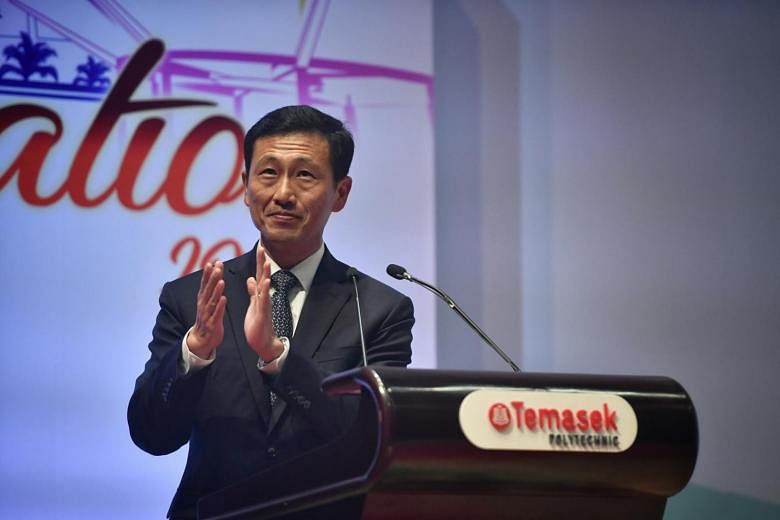Those seeking entry into polytechnics may soon find it easier to gain admission, and polytechnic students will have more options after graduation, Education Minister Ong Ye Kung said yesterday.
Speaking at Temasek Polytechnic's first graduation ceremony this year, Mr Ong said the Early Admissions Exercise - an aptitude-based exercise that allows students to receive conditional offers for admission before getting their final grades - will be expanded this year to include working adults.
"In processing the applications (for working adults), polytechnics will evaluate their current and relevant work experience, putting less emphasis on academic results attained at a young age. We hope that this will open a new door for working adults to upgrade," said Mr Ong at the ceremony.
The Polytechnic Foundation Programme - a one-year programme that caters to Normal (Academic) students - is also increasing enrolment to take in the top 15 per cent of the cohort, up from 10 per cent.
The minister added that the post-secondary school posting system will be reviewed "with a view to streamlining admissions and injecting more flexibility, recognising all-rounders as well as students with specific talents and strengths".
Pathways for poly students after graduation have also opened up. Across the six autonomous universities, more than one-third of undergraduates are poly graduates, said Mr Ong.
But he encouraged poly students to consider working for a few years before pursuing further studies, especially those in fields such as nursing or early childhood education, where "the industry values work experience, and a university education is far more useful after accumulating some years at the workplace".
He acknowledged "the preference is still to go for further studies rather than work, because many employers still hire based on academic qualifications".
"This is, however, changing, as more employers are now looking beyond academic grades," he said, citing other yardsticks of merit, such as character, interests and passion.
Mr Ong stressed: "Learning is not merely confined to what you like to do, but recognising what it takes to do your job better, and harnessing the courage to venture into something unfamiliar and uncomfortable, and master it."
At Ngee Ann Polytechnic yesterday, Minister for Communications and Information S. Iswaran also highlighted the importance of lifelong learning and upskilling.
He announced a series of bite-size courses called Professions, which will be made available by the end of this month on mobile app Gnowbe.
Singaporeans can use their SkillsFuture credits to pay for the courses, which range from data analytics to special education needs.
Addressing graduates from Ngee Ann Polytechnic's School of InfoComm Technology and Continuing Education Academy, Mr Iswaran said: "Technology is constantly disrupting industries, business models and jobs... To stay relevant and competitive, our enterprises must keep enhancing their capabilities, and our people must keep upgrading their skills and gain new knowledge."
At Nanyang Polytechnic's graduation ceremony for Chemical and Life Sciences students yesterday, Minister for Trade and Industry Chan Chun Sing reminded students to pay forward the opportunities given to them by their parents' generation.
"Your job is to make sure that in 20 years' time, you will leave behind something even better for the next generation... There is nothing to say that this little red dot of ours cannot continue to grow and glow on the world stage," said Mr Chan.


